Our showroom is open to the public. Please click HERE for more details.
Our showroom is open to the public. Please click HERE for more details.
Hardwood flooring continues to be in high demand. It is the most popular among property owners. Hardwood flooring is warm, durable, ageless, and organic. However, no matter how durable they are, it doesn’t mean that you should take them for granted. To maintain their sheen and protect your investment, you need to start caring for your hardwood floors.
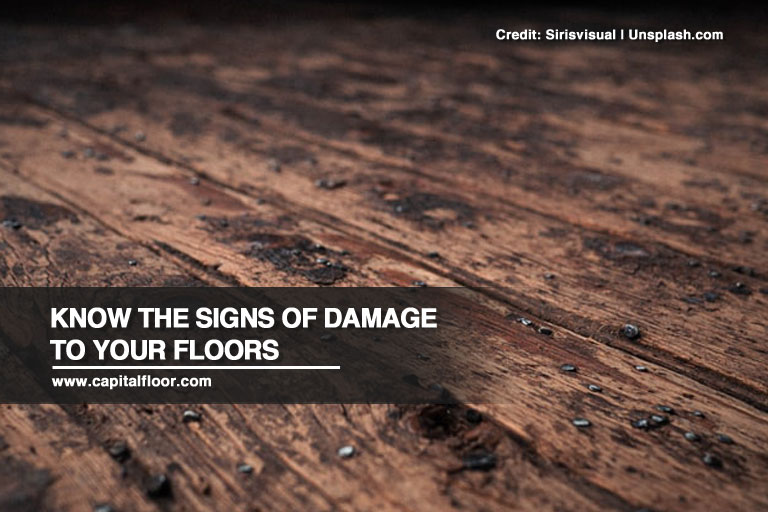
While hardwood is hardy and durable, it is prone to the following issues:
When water seeps between the boards, it causes cupping. If the borders of your hardwood board are higher than the middle, it has cupped.
Cupping is the polar opposite of crowning. If the middle of the board is higher than the edges, your hardwood has a crowning problem.
Gapping is typical on hardwood floors, especially as the wood dries out. Have your floor checked right away if there are any strange spaces between the boards.
It’s natural for your hardwood to expand and contract in response to changes in weather and humidity. In other situations, however, the hardwood does not return to its original shape, resulting in humps and bumps on the boards.
The boards on your floors become cracked as a result of low humidity and moisture. It can be caused by a variety of factors, including faulty heating and frequent usage of air conditioning equipment.
Contractors that are unfamiliar with the different types of hardwoods may use the wrong nails or install the hardwood incorrectly. The floorboards become loose as a result, and when you put weight on them, they make squeaky noises.
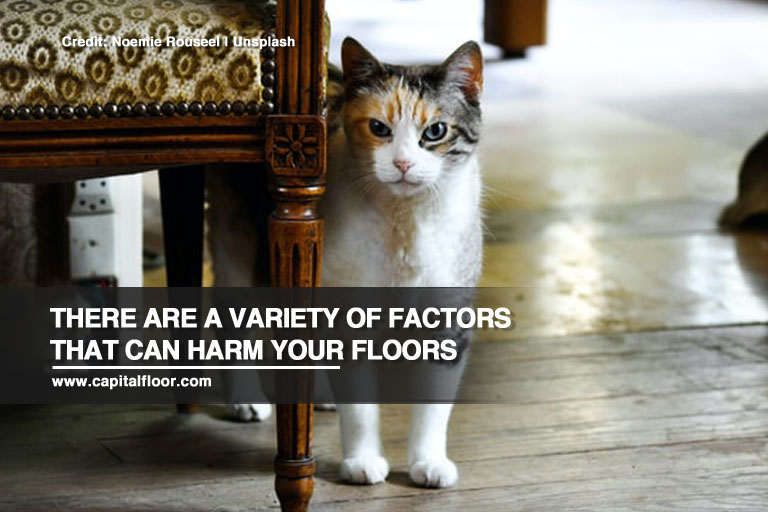
If you want your hardwood to endure a long time, you must be aware of the potential hazards and how to avoid them. We’ve included a list of important things you should be aware of so that when the warning signs first arise, you can act quickly to prevent further damage.
The most common cause of hardwood floor deterioration is excessive dampness. If you notice your hardwood expanding or shrinking, or if there are gaps between the boards, it’s important to have it checked by a professional to avoid further damage.
The humidity level in your home has an impact on the condition of your hardwood. Your hardwood expands and contracts as the humidity level changes. It causes cracks to form over time. If your wood is dry and exposed to no moisture, the cracks will become larger. It’s never ideal for your hardwood floors to be too wet or too dry. It’s critical to strike a balance between the two.
If there are a lot of people living at home, dust, dirt, mud, and other items that stick to the soles of their shoes are likely to end up on your floors. Scratches and scuff marks on the floor are also common when there is a lot of foot traffic. Invest in some soft slippers and mats to protect your floor from these.
Pet urine is one of the worst things for your hardwood flooring. It will leave permanent stains if you don’t clean it straight away or if you don’t know how to clean it properly.
If you reside in a bug-infested area, ensure your hardwood floors are properly treated. Termites are one of the many insects that might cause harm to your hardwood. Before you install hardwood flooring, make sure to examine your space and consult with an expert.
Don’ts for Your Hardwood
Though hardwood floors can last for many years, there are a variety of things that contribute to their rapid deterioration. Here are a few things to keep in mind in order to protect your beautiful hardwood floors.
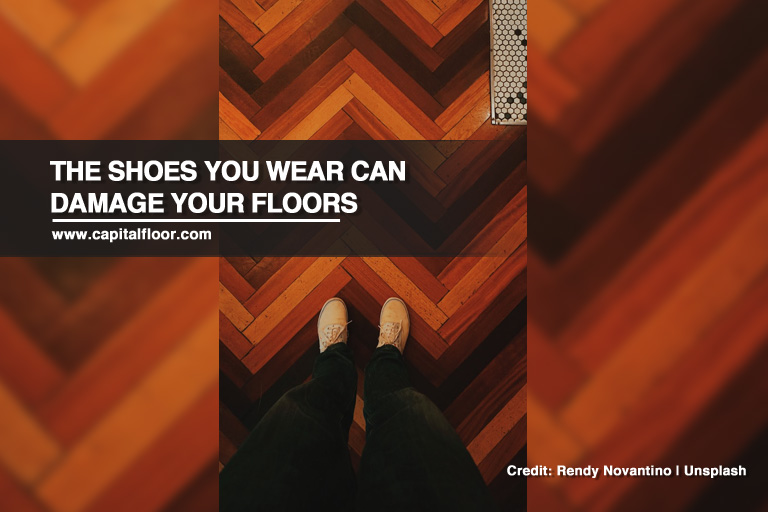
According to some experts, shoes cause more harm to hardwood floors than pets or the weather. Because you’ve been wearing them to so many places throughout the day, they’re filthy. Small pebbles can become caught in the bottoms of your shoes, scratching the finish of your floors. There are also hard-soled shoes that will scrape your floors whether or not they have been used outside.
Your pet’s long nails, like shoes, can harm the finish of your floors. Because they’re continuously running or strolling around the house, your pet’s long nails are constantly in contact with the floor.
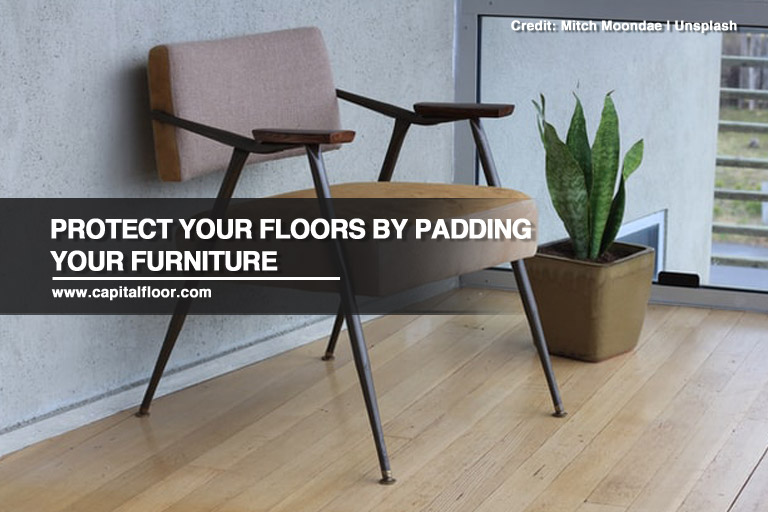
Many enjoy redecorating their homes on a regular basis. This entails rearranging the furniture. If your furniture’s legs aren’t protected, they’ll leave long, deep scratches on your hardwood floors. Even if you can carry your furniture, always place pads at the bottom of the legs to prevent scratches.
Cleaning detergents contain compounds that may affect the composition of your hardwood. While there are a variety of cleaning detergents available for your floors, be sure it’s gentle and appropriate for your hardwood floor.
If you leave your furniture in the same spot for a long time, the space beneath it may react slowly to environmental changes. As a result, it discolours the area surrounding it.
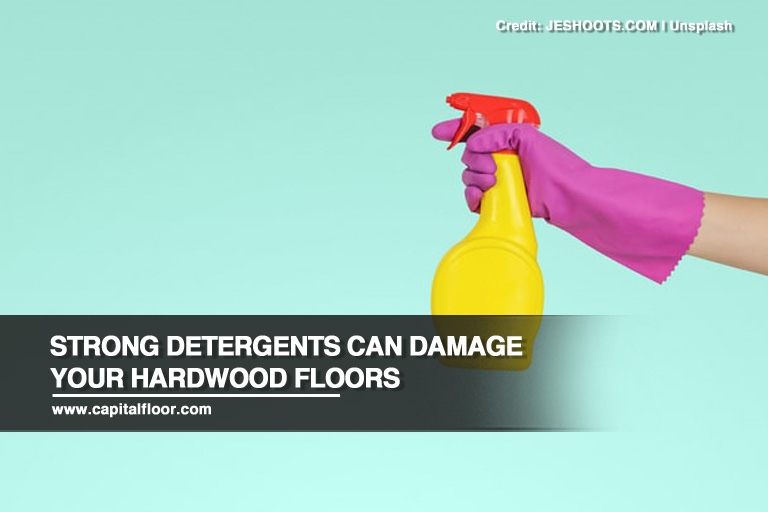
If you’ve already made a grocery list for your next trip, double-check that you have all of the essential cleaning products. Here are a few cleaning products to check off your to-do list. The following typical household cleaning detergents that are strong bases and acids must be avoided:
The activities we engage in have an impact on the condition of our hardwood. We walk around with scuff marks on our shoes, spill water on hardwood floors, and lug heavy furniture around. The lifespan of hardwood floors can be shortened by these activities. Caring for your floors requires extra attention and the use of precisely selected tools. You’ll find some suggestions below to help you keep your hardwood in good shape for many years to come.
You don’t need pricey cleaning solutions to remove scuff marks from your hardwood flooring. Here are some items you can utilize that are readily available at home.
Soak your sponge in water and wipe and rub the scuff marks on your floor carefully.
Scuff markings can be removed in the same way as pencil marks may be removed using an eraser. Simply rub the eraser over the scuff marks until they disappear.
Place the tennis ball on the broom or mop’s tip and gently glide it through the scuff marks until they vanish.
It’s critical to shine your hardwood floors on a regular basis, not only for aesthetic reasons but also to keep them in good shape. Selecting the appropriate material is critical. Before you buy and shine your floors, there are a few things you need to do beforehand.
If you take precautions with your hardwood floors, you’ll have to polish them less often and witness less damage over time.
If you’re looking for reliable hardwood flooring in Toronto, turn to Capital Hardwood Flooring. We provide quality flooring options for residential and commercial establisments. Give us a call at 416-536-2200.